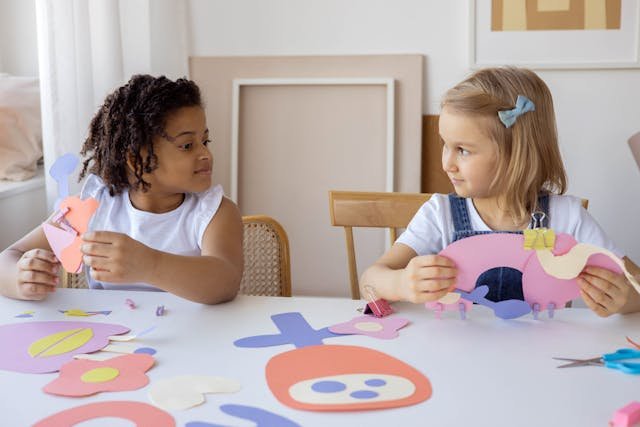Have you ever tried to learn something new when you’re really sleepy?
It’s tough. The words feel blurry. Your brain feels slow. You forget things easily. That’s because sleep isn’t just about rest. It’s about growing your brain.
For children, sleep is not just helpful — it’s essential. While they sleep, their brains are doing some of their most important work. They’re sorting out what they learned during the day, building new connections, and getting ready for tomorrow.
At Debsie, we don’t just teach kids facts and lessons. We also help families understand how things like food, focus, emotions — and yes, sleep — affect how well kids learn and grow.
Why Sleep is So Important for the Growing Brain
Sleep might look like a quiet time when the body is resting. But for the brain — especially a child’s brain — sleep is busy time. During sleep, the brain doesn’t shut down. It lights up.
Think of the brain like a big library. During the day, kids collect all kinds of new information — math rules, new words, science facts, things they saw, things they felt. But those pieces are just scattered books all over the floor. During sleep, the brain acts like a librarian. It picks up each piece, puts it in the right shelf, and makes space for more.
Without enough sleep, the brain can’t sort things properly. Kids may wake up feeling foggy. They may forget what they learned. They may feel confused or cranky. That’s why sleep is not just about feeling rested. It’s about getting smarter while you sleep.
What Happens Inside the Brain During Sleep?
Sleep might seem like a quiet time when the body lies still. But if we could peek inside the brain during sleep, we’d see that it’s actually very busy. Especially in kids.
The growing brain does some of its most important work while the child is sleeping — work that helps them think better, feel better, and learn faster the next day. Let’s explore what really goes on inside that amazing brain while the body rests.
The Brain Organizes Memories
During the day, kids take in so much information. They learn new words, solve math problems, experience emotions, talk to friends, and ask a million questions. All this gets stored in the brain — but at first, it’s just scattered and messy, like puzzle pieces on the floor.
When kids go to sleep, the brain begins to sort all that information. It puts puzzle pieces together. It connects what the child learned today to what they already knew before. It moves the most important things into long-term memory and clears out the extra noise.
This is why children who sleep well are more likely to remember what they learned in school and understand it better the next day.
The Brain Builds Stronger Connections
Our brains are made of billions of tiny nerve cells called neurons. These cells talk to each other by sending signals through pathways called synapses. Every time a child learns something new, these connections get stronger.
But they don’t get fully built during the day. The final work happens at night.
While a child sleeps, the brain strengthens the connections it used during the day. It’s like glue drying — solidifying what was practiced. So if a child practiced a new spelling word or a math trick, sleep helps make that learning stick.
Without sleep, those new brain paths may not hold. That’s why kids often forget what they studied when they stayed up too late.
The Brain Cleans Itself
Yes — the brain even has a clean-up crew! During sleep, special cells in the brain clear out waste that builds up during the day.
Just like how your bedroom gets messy if you don’t clean it, the brain also collects clutter — not dirt or dust, but used-up chemicals and signals. If that waste isn’t cleared out, it slows the brain down.
This cleaning system works best only when we sleep. If a child doesn’t sleep well, their brain stays “clogged,” which can make them feel foggy or slow.
The Brain Calms Emotions
Sleep also helps the brain understand and sort emotions. Every child goes through ups and downs during the day — joy, frustration, excitement, fear, boredom. While the child sleeps, the brain replays those moments and learns from them.
This is why sleep makes it easier for kids to wake up feeling calm and ready to face the day. It gives their heart and mind a fresh start.
Without this reset, emotions stay jumbled. This can lead to mood swings, tantrums, or sudden crying — not because the child is “naughty,” but because their emotional brain is tired and overwhelmed.
What Happens When Kids Don’t Sleep Enough?
When kids miss sleep, their brains miss out too. A tired brain struggles to:
- Focus in class
- Remember lessons
- Stay calm under stress
- Solve problems
- Handle big emotions
Even just one or two nights of poor sleep can make school feel harder. Over time, if poor sleep becomes a habit, it can slow down a child’s learning, affect their mood, and even hurt their health.
Kids who don’t sleep enough may seem lazy or unmotivated, but the truth is — their brains are just tired. And tired brains can’t do their best.
How Much Sleep Do Kids Actually Need?
You’ve probably heard that kids need “a lot” of sleep — but what does that really mean? And why do they need more sleep than adults?
The answer is simple: because their brains are growing much faster.
Every single day, a child’s brain is building new connections, solving new problems, learning new skills, and handling big emotions. All of that takes mental energy. And the only way to fully recharge that energy is through sleep.
Sleep is not just for rest — it’s for growth. It’s the time when the brain presses “save” on everything it learned that day. Without enough sleep, the brain can’t hold on to those lessons. It also can’t build new ones as easily the next day.
That’s why the amount of sleep a child gets directly affects how well they learn, remember, and behave.
Sleep Needs by Age
Sleep needs change as children grow. Younger kids need more because their brains are still doing basic building — things like learning to speak, walk, count, and socialize. As they get older, they still need plenty of rest to keep up with the increasing mental and emotional demands of school and life.
Here’s a gentle guide:
- Ages 5–6 years: Most kids this age need 10 to 12 hours of sleep every night. Their brains are still in heavy development mode, learning basic literacy, numbers, and emotional self-control.
- Ages 7–12 years: These school-aged children usually need 9 to 11 hours of sleep. This is the age where more complex subjects are introduced. Good sleep helps them stay focused and build strong memory skills.
- Ages 13–18 years: Teens need 8 to 10 hours of sleep — but many don’t get it. Their brains are going through another major growth spurt, especially in areas like problem-solving, decision-making, and emotion control. Not getting enough sleep can lead to stress, sadness, and poor school performance.
Even just losing one hour of sleep a night can affect a child’s mood, memory, and learning speed the next day. Over time, small losses build into big problems.
What Keeps Kids From Sleeping Well?
Most kids want to sleep. Their bodies need it. Their brains love it. But sometimes, even when bedtime comes and the lights go off, sleep just doesn’t come easily.
There are many reasons why kids struggle to sleep — and most of them are simple, everyday things that build up quietly. Let’s walk through the most common ones, and why they matter so much for the developing brain.
1. Too Much Screen Time Before Bed
Screens are everywhere — TVs, tablets, phones, video games. Kids love them, and they can be fun and even educational. But when used too close to bedtime, screens can confuse the brain.
Here’s why: Screens give off something called blue light. This light tells the brain, “Hey, it’s still daytime!” So even if it’s 9:00 at night, the brain thinks the sun is still up. As a result, it doesn’t make enough melatonin — the natural sleep chemical that helps us feel drowsy and ready to rest.
That means children may go to bed on time but toss and turn for a long time. Or they may fall asleep but wake up during the night. Either way, they don’t get the deep sleep their brain needs.
2. Stress and Overthinking
Even young children can carry a lot on their minds. Worrying about schoolwork, friendship problems, upcoming tests, or even something they saw on TV can keep their brains spinning long after bedtime.
Kids may not always say, “I’m stressed.” Instead, they may say:
- “I can’t sleep.”
- “My tummy hurts.”
- “I don’t feel tired.”
What’s really happening is that their emotional brain is still awake. It’s still trying to figure things out, which blocks the body from relaxing. Without help, this can turn into a nightly habit — and bedtime becomes something they fear or fight.
3. No Consistent Bedtime Routine
The brain loves patterns. Just like we eat at certain times and go to school on a schedule, the brain expects bedtime to happen the same way each night.
When bedtime is always changing — sometimes at 8 PM, sometimes at 10 PM — the brain gets confused. It doesn’t know when to start slowing down. This makes it harder to fall asleep and harder to wake up feeling fresh.
A calming bedtime routine (like brushing teeth, reading a book, and turning off the lights at the same time every night) teaches the brain, “It’s sleep time now.” It feels safe and familiar — and that leads to better rest.
4. Eating or Drinking Late in the Evening
Sometimes kids eat dinner late or snack right before bed — especially sugary treats or caffeine-filled drinks like soda or chocolate milk. This can make their bodies feel too “awake” when it’s time to wind down.
Caffeine stays in the body for hours. Even a small amount in the evening can make it hard to relax. And sugary snacks can give a quick burst of energy, followed by a crash — but not the deep rest kids really need.
That’s why light dinners and calming bedtime snacks (like a banana or warm milk) are better choices. They tell the body, “It’s time to slow down.”
How Parents Can Help Build Better Sleep Habits
Helping your child get better sleep doesn’t mean being strict or setting up a bunch of rules. It means creating a space — both in the home and in the heart — where the body feels calm, the mind feels safe, and the brain knows it’s time to rest.
Sleep habits aren’t built overnight. But with love, patience, and small changes, you can help your child fall asleep faster, sleep deeper, and wake up brighter.
Here’s how you can gently support your child’s sleep — starting today.
1. Create a Sleep-Friendly Routine
Children thrive on routines. When they know what comes next, their brain feels safe. That’s why a bedtime routine is so powerful — it signals to the brain: “We’re winding down now.”
This routine doesn’t need to be long or complicated. In fact, the simpler it is, the better. A good bedtime rhythm might include:
- Turning off screens and dimming the lights
- Brushing teeth and changing into pajamas
- Reading a short, calming story or just talking quietly
- A few minutes of hugs, prayers, or gentle conversation
- Lights out at the same time each night
Doing these things in the same order every night helps the brain settle faster. Over time, the routine becomes a signal for the body to get sleepy — naturally.
2. Keep a Consistent Bedtime and Wake-Up Time
One of the most powerful sleep tools is something parents often overlook: the clock. When children go to bed and wake up at different times every day, their internal body clock gets confused. This makes it hard to fall asleep on time — and even harder to wake up feeling rested.
Try to keep your child’s bedtime and wake-up time within 30 minutes of the same time every day, even on weekends. It doesn’t have to be exact, but it should be close.
This builds a rhythm. And the brain loves rhythm. Over time, it starts producing sleep hormones right on schedule — making bedtime smoother and mornings easier.
3. Make the Bedroom Calm and Comfortable
The sleep environment matters more than we think. If the bedroom is noisy, bright, or full of distractions, the brain can stay alert even when the child is tired.
Try these simple tips:
- Keep the room cool, quiet, and dimly lit
- Remove screens or loud toys from the sleeping space
- Use soft nightlights if needed, or blackout curtains if too much light comes in
- Allow a comfort item — like a soft blanket or favorite stuffed animal
Even a few small changes can turn a busy room into a calm “sleep zone” that helps the brain relax.
4. Talk About the Day Before Bed
Sometimes, kids can’t sleep because their minds are still full of feelings. Maybe something hard happened at school. Maybe they feel excited, nervous, or just unsettled.
Bedtime is a wonderful time to pause and connect emotionally. Ask your child:
- “Was anything on your mind today?”
- “Did anything make you feel sad, happy, or worried?”
- “What was your favorite part of the day?”
You don’t need to give perfect advice. Just listening helps children feel safe. And when the heart feels safe, the brain can rest.
How Parents Can Help Build Better Sleep Habits
Helping a child sleep better doesn’t require a strict schedule or fancy tools. It starts with simple, loving habits that make bedtime feel calm, safe, and consistent. When parents support healthy sleep patterns, they’re also supporting the child’s brain development, mood, and learning abilities.
Let’s look at some gentle and realistic ways to make sleep easier for both kids and parents.
Set a Consistent Bedtime
One of the most powerful things you can do is set a regular bedtime — and stick to it as often as possible. Even on weekends. When bedtime changes a lot, the brain gets confused. It doesn’t know when to release melatonin, the sleep hormone. But when bedtime is steady, the brain starts to get sleepy on its own.
This doesn’t mean being strict or shouting, “Go to bed now!” It means gently winding down at the same time each night so the body and mind can prepare.
A good bedtime rhythm might look like:
- Dinner around the same time
- A bit of quiet play or reading
- Brushing teeth
- Dim lights
- Cuddles or calming words
- Lights out
Even if the bedtime routine takes just 20–30 minutes, repeating it daily helps kids feel relaxed and ready.
Make the Bedroom a Sleep-Friendly Space
Where your child sleeps matters, too. Their bedroom should feel like a place to rest — not a place to be busy or overstimulated.
Some helpful tips:
- Dim the lights an hour before sleep to help the brain settle.
- Keep the room cool and quiet, or use a fan or soft sound machine.
- Remove bright screens — phones, tablets, or TVs — at least one hour before sleep.
- Keep toys and distractions away from the bed, so the brain knows: “This is a place to sleep.”
You don’t need to redecorate the whole room. Just make small changes that help the brain feel safe and still.
Use Bedtime as a Bonding Time
Many kids resist bedtime because they don’t want the day to end — especially if they didn’t get enough one-on-one time with their parent during the day. So instead of treating bedtime as a battle, treat it as a moment of connection.
Talk to your child. Ask how their day went. Let them share what’s on their heart. You don’t need to fix every problem. Just listen. That simple act of being heard helps their mind settle.
A few calming questions you can ask:
- “What was something good that happened today?”
- “Is there anything on your mind?”
- “What are you looking forward to tomorrow?”
This gives the child a safe emotional landing before they drift off to sleep.
How Debsie Helps Kids Build Better Sleep and Better Brains
At Debsie, we understand that a child’s ability to learn isn’t just about how smart they are. It’s about how well their brain is working — and sleep plays a huge role in that.
That’s why we don’t just teach lessons. We also support healthy habits that help the brain grow — like focus, emotional control, confidence, and yes, good sleep routines.
Here’s how Debsie plays a quiet but powerful role in helping kids sleep better — and learn better too.
Calmer Minds = Better Sleep
In every Debsie class, children are taught in a way that reduces stress, not adds to it. Our teachers are kind, patient, and trained to support each child’s emotional wellbeing. This helps children feel relaxed and confident — not anxious about lessons or afraid of making mistakes.
When kids end their day with calm learning, not pressure or panic, they sleep better. Their brain doesn’t carry stress to bed. It carries curiosity and calm.
Smart Scheduling That Supports Sleep
Our live classes are thoughtfully scheduled to respect each child’s time zone, sleep needs, and attention span. We never overload children with back-to-back lessons. And for kids who prefer learning at their own pace, our self-guided courses allow them to learn during the time of day that suits them best — whether that’s morning, afternoon, or after a nap.
This means children never have to sacrifice sleep just to keep up. At Debsie, we work with the child’s rhythm — not against it.
Teaching Kids to Understand Their Brains
Our lessons often include short, simple explanations about how the brain works — like why sleep helps memory, or how the brain builds habits. We teach kids that their brain is like a muscle, and rest is part of growing strong.
This builds awareness. When a child understands why sleep matters, they’re more likely to value it. It becomes a part of their learning journey — not something that gets in the way.
Helping Parents Support Sleep at Home
Debsie supports families, not just students. We give parents helpful tips and gentle reminders — through our blog, emails, and community — about how things like sleep, food, focus, and emotion affect learning.
This helps parents build a home routine that supports school success — without stress. Because when home and learning go hand-in-hand, children thrive.
At Debsie, we believe in growing whole learners — not just kids who get good marks, but kids who sleep well, feel strong, and wake up excited to learn.
Conclusion: Sleep Builds Smarter, Stronger, Happier Kids
Sleep isn’t just a break between days. It’s the secret workroom of the brain — where memories are saved, emotions are sorted, and new learning gets locked in.
For growing children, sleep is not optional. It’s essential. Without it, even the smartest child can struggle to focus, forget what they’ve learned, or feel overwhelmed by simple tasks. But with good sleep? Their minds grow stronger, faster, and calmer.
As parents, the power to support better sleep is in your hands — not through pressure, but through patience. With simple routines, gentle habits, and loving connection, you can help your child build the kind of sleep that leads to a brighter mind and a better day.
At Debsie, we know that smart learning starts with a healthy brain. That’s why we support the whole child — not just with lessons, but with guidance on sleep, focus, and emotional balance.
Because when a child is well-rested, they’re not just ready for school — they’re ready for the world.
👉 Join a free trial class at Debsie and give your child the tools to learn deeply, grow confidently, and sleep soundly.
Read Next:



